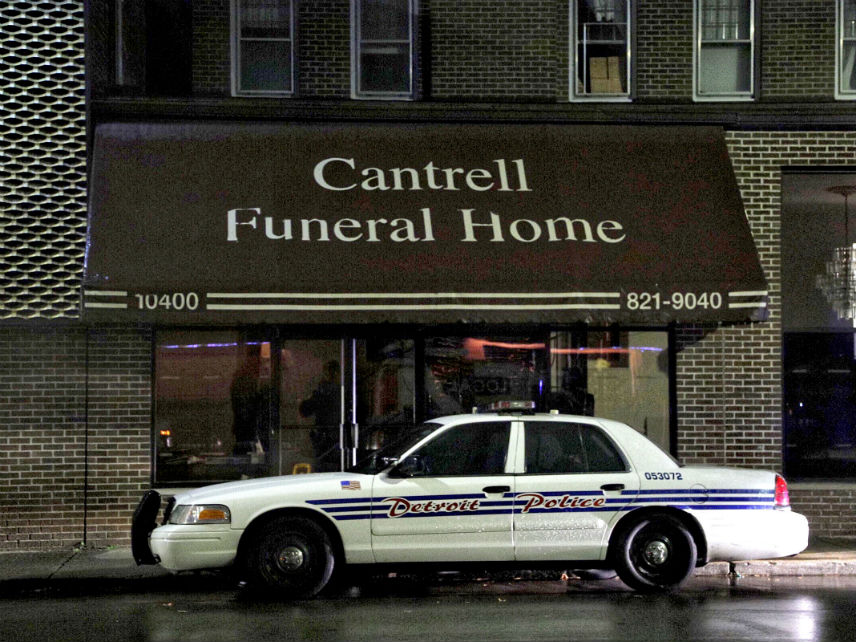Detroit to Pay $225,000 After Cops Shoot Three Dogs in Marijuana Raid
The settlement is the latest big payout in a string of lawsuits over dog shootings by Detroit police.


The city of Detroit will pay $225,000 to settle a civil rights lawsuit stemming from a 2016 marijuana raid that left three dogs shot to death by police.
The Detroit City Council approved the settlement this February to Kenneth Savage and Ashley Franklin, who filed a federal lawsuit against the city and three Detroit police officers last July. The lawsuit alleged the officers shot Savage and Franklin's three dogs while the animals were enclosed behind an 8-foot-tall fence—all so the officers could confiscate several potted marijuana plants in the backyard.
"As far as I know this is the largest settlement of this kind that the city of Detroit has made," says Chris Olson, the attorney for Savage and Franklin who was represented plaintiffs in several other dog shooting lawsuits. "I think it was very serious matter, and the city's settlement reflects that."
Detroit has been sued multiple times over the past few years for police shootings of dogs. In 2016, the council approved a $100,000 settlement to a man after police shot his dog while it was securely chained to a fence.
A 2016 Reason investigation found that the Detroit Police Department's Major Violators Unit, which conducts hundreds of drug raids a year in the city, had a nasty habit of leaving dead dogs in its wake.
One officer had killed 69 dogs over the course of his career, public records obtained by Reason showed. That officer is now up to 73 kills, according to the most recent records.
Reason reported on Savage and Franklin's suit after it was filed last summer:
According to a search warrant affidavit, a Detroit police officer, while investigating an unrelated matter, observed several marijuana plants outdoors at the home of Savage, Franklin, and their son.
Two days later, eight Detroit police officers arrived at the house. Police were aware Savage and Franklin had a permit to grow medical marijuana, but the plants were in violation because they were visible outside, the search warrant affidavit said.
When Franklin showed police her marijuana paperwork and demanded to see a search warrant, an officer responded, "If you keep asking for a warrant, we are gonna kill those dogs and call child protective services to pick up your kid," the lawsuit says.
Officers detained Franklin and searched the house, but could not get to the marijuana plants because of the dogs. They initially called animal control but decided to destroy the animals, the lawsuit says. Officers shot and killed one dog through the fence, broke into the backyard enclosure, and fatally shot the other two. Animal control arrived ten minutes later.
As I've written before, while better training and policies for handling dogs might stop some of these incidents, until Detroit changes the way it prosecutes the drug war these shootings are almost guaranteed to continue, along with very expensive lawsuits and payouts.
Rather than scale back the armed drug raids it conducts throughout the city on a daily basis, Detroit has dug in and fought back against the lawsuits by advancing a novel legal argument: that if a dog isn't properly licensed with the city, it is "contraband" for the purposes of the Fourth Amendment, and therefore its owner does not have a constitutionally protected interest in it.
Last August, a federal judge dismissed a civil rights lawsuit against several Detroit police officers who shot and killed Nikita Smith's three pit bulls during a 2016 marijuana raid.
Although U.S. District Court Judge George Caram Steeh found that Smith's lawsuit would have been dismissed even if she had a cognizable interest in the dogs, he wrote that, "When a person owns a dog that is unlicensed, in the eyes of the law it is no different than owning any other type of illegal property or contraband."
The case was the first time a federal court considered the question of whether an unlicensed dog, in violation of a city ordinance, is protected by the Fourth Amendment. Smith's case is now being appealed at the Sixth Circuit Court of Appeals, where oral arguments are scheduled for April.
However, earlier this year another U.S. district court judge rejected the city's argument and allowed a similar lawsuit to proceed.
Nicole Motyka and Joel Castro sued several Detroit police officers in 2016 after two of their dogs were shot during a marijuana raid. According to the lawsuit, police killed the dogs from behind a barrier while Castro was on the ground shouting, "All I have is weed. Don't kill my dogs."
The city argued that one of Motyka's dogs was unlicensed, and she therefore had no property interest in it. In his opinion, U.S. District Judge Arthur Tarnow wrote that Detroit's argument "is misplaced for several reasons."
"Nowhere in Michigan's Dog Law is there language that 1) deprives a dog owner of her possessory interest in her dog simply because the dog is unlicensed, and/or 2) authorizes the killing of a dog by virtue of the fact that it's unlicensed," he wrote.
